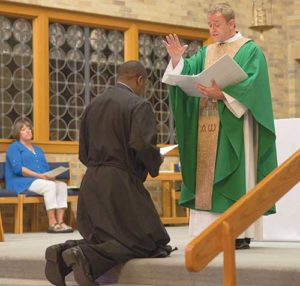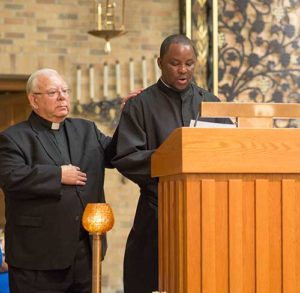MILWAUKEE — When Simon Muema didn’t return home one Sunday evening in November 2014, police offered Salvatorian Fr. Paul Portland what they considered a logical explanation.

Salvatorian Fr. Joe Rodrigues, U.S. provincial and National Vocations Director, prays over Simon Muema, during Mass on Sunday, Aug. 14, when Muema made his first profession as a Salvatorian. (Catholic Herald photo by Peter Fenelon)
“He just wanted to leave and didn’t want to tell you,” Fr. Portand recalls being told when he went to the police station to file a missing person’s report.
Fr. Portland, director of candidates for the Society of the Divine Savior (Salvatorians), explained that a report was eventually filed for the missing Muema, but it was considered non-critical because the police thought he likely left of his own free will.
Muema, 40, a native of Kenya, who came to Milwaukee and joined the Salvatorians in July 2014 with the intention of becoming a priest, was last seen volunteering at the St. Ben’s meal program on Sunday evening, Nov. 30.
The following day, Muema’s housemates at the Salvatorian formation house in Greendale noticed he had not come home and his car was missing. They let Fr. Portland know and he checked with Cardinal Stritch University and discovered Muema had not shown up for his classes, something he had never missed.
That’s when he went to the police department for the first time. After being told it was likely Muema left of his own accord, Fr. Portland went home mulling over the possibility. It just didn’t make sense to him, for Muema was an eager, conscientious young man who seemed to be clearly drawn to priesthood with the Salvatorians. Could it be possible he no longer felt drawn to a religious vocation, wondered Fr. Portland.
Yet he knew that was not the case, Fr. Portland told the Catholic Herald in a July 22 interview in his office. “Besides, what young person would leave and leave his computer behind?”
For days, the Salvatorians had no idea what had happened to Muema until they heard a television news report that a man had been shot on Milwaukee’s north side.
They went to area hospitals in search of him and finally, on Thursday, four days later, discovered Muema, still unconscious entered in the hospital records as “John Doe.”
He was hanging on to life by a thread, the victim of shots to his stomach, his groin and his leg. His spleen had been ruptured and had to be removed, he had to be operated on to have a bullet removed, his leg was broken, his pancreas and liver were damaged and he was on life support.
“They didn’t think I was going to make it,” admitted Muema in an interview with the Catholic Herald. “They disconnected the feeding tube – which I had because I couldn’t eat, disconnected everything for a whole day, but I did not die and they returned the medicine again.”

Simon Muema, right, makes his first profession of vows as a Salvatorian on Sunday, Aug. 14, at St. Pius X Church, Wauwatosa. (Catholic Herald photo by Peter Fenelon)
Yet, after months of rehabilitation at Froedtert Hospital and Alexian Village, Muema pulled through. Last Sunday, he made his first profession as a Salvatorian during the 10:15 a.m. Mass at St. Pius X Parish, Wauwatosa.
Admitting he was depressed following the shooting, during the long rehabilitation, Muema said the experience has shown him the strength of his faith.
“I know God has a purpose for me. He said, ‘Simon, it’s not over yet.’ I know he has a special mission for me,” he said.
He also admitted that the shooting has left him with scars beyond the ones on his leg and stomach. He’s less trusting of others and lives with the fear that the man who shot him may “want to finish the job.”
It was a young man who shot him – someone about 22 years old – whom Muema had seen regularly at the meal program. He often chatted with him and even ran into him a couple times at an area gas station near the meal program. In fact, the two had struck up a friendship of sorts and Muema spoke with him several times about helping him find employment at a McDonalds or Walmart so he wouldn’t need to “hustle” for money at the gas station.
“I wanted to introduce him to one of the African Amercian friends I know at Cardinal Stritch,” said Muema, explaining that he wanted him to earn his own check “and not have to stand at the gas station asking for quarters.”
The evening the shooting took place, Muema said the young man, who he knows as Cody, asked him for a ride home, something he had done on a couple occasions.
Muema said Cody seemed depressed that evening and as they drove, he remembers him saying, “Simon, please, I really need help.”
What help do you need, Simon remembers asking. He was astounded when Cody said he needed $250 or $300.
“Excuse me. I thought he was joking,” said Muema, recalling that he told him, “You know I am a seminarian and we don’t have that money. Hey bro, if I had that kind of money, I’d send it back to Africa to buy food for the kids,” he said, referring to his five nieces and nephews who are being raised by his 76-year-old mother, Brigit Nindi, following the deaths of his siblings, their parents.
Once he told Cody he did not have the money for him, Muema said he sensed a change in his passenger.
“I had no idea he was carrying a gun. I had no idea he was that aggressive. He was always nice in the soup kitchen and did not really look homeless. He comes in clean,” said Muema, who saw Cody grab the car door handle. He thought Cody was planning to get out of the car, but instead pulled a gun and shot Muema.
The next few minutes are a blur, but Muema, a former high school volleyball and basketball player, said they somehow made it outside the car and began fighting. Muema got ahold of the barrel of the gun and hung on. Eventually Cody ran off, leaving Muema injured and bleeding, lying in the 2000 block of North 39th Street.
Muema remembers hearing people nearby, but no one came to his aid. He figures they saw two people fighting and did not want to get involved.
He managed to find his cell phone and dialed 911, but the operator wanted to know where he was. He had no idea.
Eventually some of the people nearby came close enough to the phone to shout the address into the phone and police arrived shortly.
He lost consciousness soon after, which is why he could not tell them who he was in order to let his fellow Salvatorians know of his plight. He spent the next month, including Christmas, in the hospital and the next seven months in rehab.
The emotional healing has been a process, too, he admitted.
“I grew up in a country where we are even friendly to a stranger, even a stranger on the street, someone waiting for a bus, people share wherever you go in the village and I still bring that mentality here 10 years down the line,” he said. “But this kind of changed me. I need to know somebody now before I open up. I need the other person to open up to me, then I can trust them.”
Muema said he’s also been asked by many people if he forgives the man who shot him.
“I can forgive him if he forgives himself first, but he has to (settle with) the law. The jail is somewhere you learn how to correct your mistakes because that is where he belongs,” he said.
Muema said the experience has not been without lessons.
“I reached a point where I asked God why this happened to me. Why did he put me on this journey?” he asked, thinking of the happy life he left in California where he lived for 10 years, attending Riverside College, double majoring in social work and nursing and working
in home health care.
“Really, God, I left my life in California for this, to wake up early for prayers, Mass, go to chapel, prayer, ministry. It was a totally different life that I wasn’t planning and then I go and get shot. I asked God why he did this for me.”
But Muema said he reevaluated his life and realized he was complaining too much.
“Many people go through worse,” he said, adding that maybe God was teaching him a lesson.
“The lives of saints, or some saints go through hell to be where they are. They went through a lot, were persecuted and if I was expecting God to choose someone else other than me, that’s selfish,” he said.
Muema said he is approaching his ministry with this new perspective on what he experienced. He has been changed, however. He no longer is comfortable ministering in a meal program setting, and, in fact, requested a different ministry assignment. With an associate degree in mathematics, he now tutors Wauwatosa Catholic middle school students in math, and he admitted when he drives downtown to attend a Marquette or Bucks basketball game – something he enjoys in his free time – his stomach clenches as he relives that awful night nearly two years ago.
When he saw people in the food service line at a meal program, “it took my mind back to the shooting. I was thinking I want to help those people so badly, but now my trust is not there.”
During Mass where Muema made his first profession, Fr. Portland, his formation supervisor, choked back tears during his homily as he reflected on the journey Muema traveled after being shot.
“I journeyed with him the nine months it took for recovery, going each day to Froedtert or Alexian Village. I cannot tell you how much the support of the Pius family meant to me during those long days and I am sure all the prayers secured his recovery,” he wrote in the parish bulletin.
